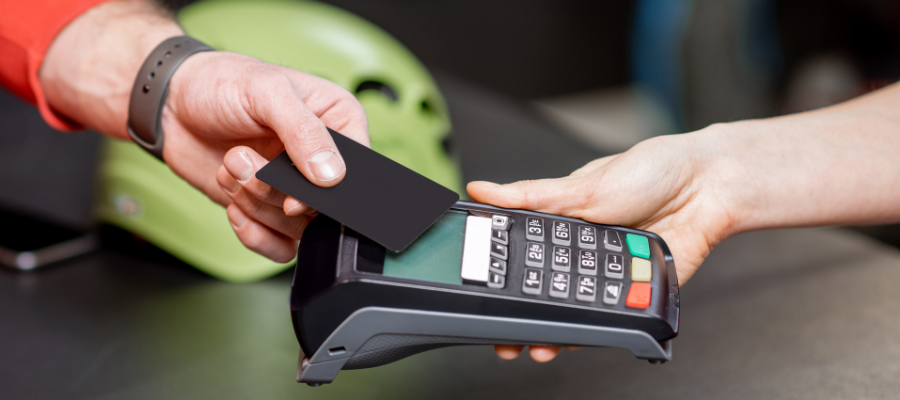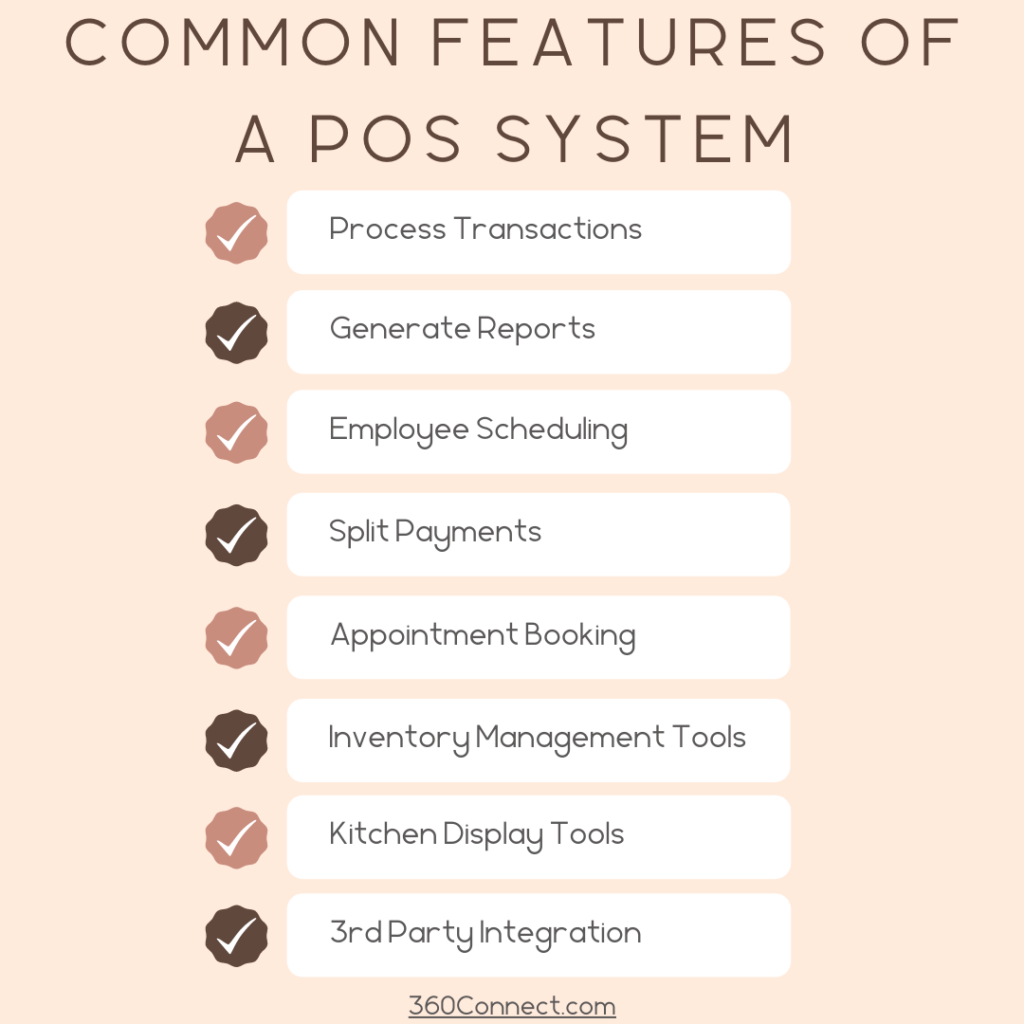A POS (point of sale) system is the combination of the location, hardware, and software used to process a sale of goods or services. This can include payment in the form of cash, credit/debit card, digital currency, or check.
You will find POS systems in virtually every store whether online or in person. A POS system is necessary to improve the customer experience and track sales for your business.
Additional Reading: What is a POS System?
Key Takeaways
- POS Systems use a combination of software and hardware.
- POS system cut administrative tasks.
- POS systems offer free and paid versions for services.
How a POS System Functions

Let’s say that a customer wants to purchase an item at your store. They come to the cash register and set down their items. You then use a barcode scanner to scan the items for sale and calculate the total purchase amount. From there, the customer pays by credit card and uses a card reader to complete the transaction. The card reader records the transaction and charges the bank of the cardholder for the money. The purchase goes through, and the customer goes on their way. Essentially, this is how a POS system processes a transaction for a store.
What is needed in a Common POS transaction?
- Barcode scanner
- Cash drawer
- Tablet/Mobile Phone/Computer
- Card reader
- Receipt printer
You’ll also need POS software to run on your tablet/mobile phone/computer. This software will use the hardware to process and record the transaction. You don’t have to have a barcode scanner if you don’t have to scan physical products (e.g., restaurants, those purchases can be chosen in the software).

POS Systems by Industry
As you noticed in our common features of the POS list, not every feature is applicable to your business. If you work in construction, you don’t need a kitchen display system. Here are how some industry-specific POS systems can affect you. Additionally, here are the 8 different types of POS systems to choose from.
Retail services usually need a POS system that comes with a barcode scanner, computer POS, card reader, and cash register (a fully realized POS terminal). You can find many POS options for retail because there are so many providers. You’ll most likely need a POS terminal with multiple ways to accept payment. Another type of POS system to invest in would be a self-service kiosk. This would allow guests to use a computer or tablet and barcode scanner to check out their own items.
You can expect to spend anywhere from $50-$300 on a POS system. That does not include monthly fees which will be an additional cost. Are you a small business just starting out and need to be able to take card payments? Square allows business owners to use their card readers for free and charges a small transaction fee of 2.6% + 10¢ per swipe.
There is a wide array of restaurant types, which means that not all types of restaurant POS systems will work for you. Some food trucks just need a handheld POS system, while a fine dining restaurant may need a fully customized POS terminal. Whichever you need, you have plenty of options. You can start selling on your phone with POS software or use a tablet POS system for your local shop.
You can find the top restaurant POS systems here.
In the United States, most healthcare facilities need a POS system to charge customers after receiving care. Healthcare services may also charge customers through a mobile application as well. Any POS system for healthcare should have the option for online as well as in-person payment. Additionally, healthcare facilities may want to work one on one with a provider to find a custom POS solution for them.
According to Fit Small Business, you can expect to spend anywhere from $0-$5,000 dollars on hardware with an additional cost monthly for software.
POS systems for transportation come in many forms just like the restaurant industry. The transportation industry services a wide range of payments and usually uses some form of mobile application or software. Unless you are starting a small transportation company, you will most likely need multiple POS terminals.
This is a significant investment and prices can start at a couple of thousand dollars to much more depending on the advanced software features you need.
Benefits of a POS System
Improve Efficiency
A POS will allow you to process transactions at a much quicker pace than older methods. Not only that, but most software is intuitive for employees to use. It also provides simplicity for the customer. Just pay in your preferred method and you’re good to go!
Collect Data
Today, data can give you insight into who your customers are and their preferences. Some POS systems can help you catalog data such as:
- Name
- Phone Number
- Email Address
- Favorite/Common Order
- And more!
The right POS can make it easier to maintain repeat customers and adjust your services based on needs.
Improve Customer Service
Do customers like POS systems? Absolutely! One of the major benefits of a POS system is the ability to provide improved customer service. Your POS system will help you process tractions faster and more easily for you and the customer involved. POS systems also make it easy to track sales across multiple devices, whether that be online, handheld POS, or in the store.
Conduct Rewards Programs
One of the best ways you can keep customers coming back is through rewards or loyalty programs. POS systems can help you track customer interactions and create reward systems for you. No more punch cards, customers can just be notified of new rewards by email or text. The best part? You can automate most of this process.
Expand Your Reach
We’ve talked about this before, but it bears repeating, that the right system can help you track sales online. You don’t need to integrate multiple tools to make this happen either. You just need to make sure that your POS can adapt to multiple modes of business.
Inventory Management
Time is money even when it comes to inventory management. POS systems can automatically track your inventory and help you manage your supply. You will be able to streamline the back-office duties and make sure that your customers always have access to the products they need. This feature most likely won’t come with a free POS system, but it can be well worth the money to save time and improve efficiency.
Accept Multiple Payment Formats
Don’t limit your customer base by just taking one form of payment. They can benefit you by accepting multiple payments whether that be cash, card, check or some other form. This provides the customer with multiple options and can only increase your bottom line.
Simplicity
POS systems allow transactions to be simple and easy for the customer. Just swipe your card or pay in cash. It’s really that simple and customers love it!
Are you looking for a POS system to help you? Wondering what the right option is for your business? At 360Connect, we can help. We pair high-quality suppliers with customers in their area. You just need to fill out our 1–2-minute form and we’ll contact you to confirm your needs. From there, you can receive up to 5 100% free quotes on services. It’s that simple.

